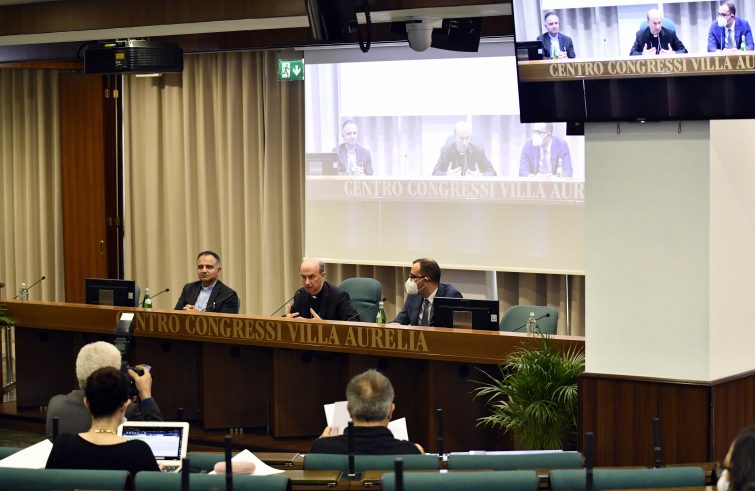
The data on Italy’s economic recovery suggest “a favourable response to a positively evolving situation” said Msgr. Stefano Russo, Secretary of the Italian Bishops’ Conference (CEI), answering journalists’ questions during the closing press conference of the Italian bishops’ Permanent Council, which ended yesterday, September 29, in Rome. “However”, Msgr. Russo pointed out, “the positive economic impact should be coupled with a careful concern for the lives of all people, especially the most disadvantaged and those in need.” “The lesson drawn from the pandemic is that everything is interconnected, which means that positive relations between people must be encouraged, with due regard for everyone’s lives and their living conditions,” said the CEI Secretary-General. “Rather than submitting a request to the government”, added Monsignor Erio Castellucci, CEI Vice-President, “the bishops are voicing the requests of the people they meet, the men and women of their communities. There is a strong need to support and remain close to those who are suffering the most, those with limited opportunities to recover. The bishops engage in dialogue with local institutions more than with the government: we are always in touch with our Caritas agencies, which repeatedly point out – and not from today – that there is a growing divide between those with have more and those who remain behind. Economic recovery indicators, while encouraging, represent an estimate, they don’t tell us that some are left in difficult straits.”
Politics and young people. “Political engagement must not involve attacking others”, pointed out Msgr. Castellucci on the sidelines of the press conference. “There is a need for politics based on reasoning, focusing on the real issues that must be addressed avoiding personal attacks and by reflecting on the nature of the problems at stake,” he said in response to a question on the present political climate, at times exacerbated by tensions. “This principle is valid in all circumstances, and it appears to have been somewhat neglected in Italy over the past few years”, the bishop remarked. “The idea of politics as a constructive exchange of views, even if it is sometimes heated, but always respectful of others, must be recovered. That is the future of politics.” “Young people are disaffected with politics also because they see no form of long-term project that extends beyond electoral consensus. Sometimes, for the sake of voter consensus, attacks are staged that are of little relevance to the common good.” On the subject of the forthcoming elections, the CEI Vice President remarked: “I hope to see a positive response. We must all roll up our sleeves and recover our voices, which for the people means exercising the right to vote, and strive to contribute constructively.” “Young people,” noted the bishop, ” show us that a wave of interest and moral suasion are possible. This bodes well for the future, because it is a forward-looking approach. Clearly, young people are passionate about certain issues: perhaps a new political season will be created by them.”
Pandemic and returning to in-person activities. The outbreak of COVID-19 has had a major impact on the relationship between the real and virtual worlds, Msgr. Russo noted. Answering a question from journalists, he said: “It’s very important for Church life to return to in-person mode and hopefully we will be increasingly free to do so.” “Moreover, digital technology and video screens were very important in the most critical phases of the pandemic,” said the bishop, “because they brought out the strong need for the community to come together and to do so in person.” “Digital tools are extremely useful,” the Secretary General of the Italian Bishops’ Conference pointed out, “and they will continue to be useful in many contexts, but normal life is about meeting people, listening to each other and experiencing closeness, which characterises human relations.” “We are now trying to identify ways to enhance this opportunity, which took us by surprise,” Msgr. Castellucci said with regard to the new media: “Before the pandemic, I often criticised the excessive use of social networks. But I now see many reasons to believe that – while giving priority to in-person encounters – some aspects of that dimension can be incorporated therein.”
No to euthanasia, yes to life. “The Church will continue to proclaim the value of human life”, Msgr. Russo said in response to a question on euthanasia. “During the Permanent Council,” he said, “the importance of being ‘pro-life’ emerged strongly – not against but at the service of the men and women of our time.” “The Church will continue to proclaim the value of life, that life is worth living, and to be a witness of the care for all people, against euthanasia and against the ‘throwaway culture’, which the Pope has denounced on many occasions”, pointed out the CEI Secretary General.
The Synod. “The doors are open to all, the groups are open to everyone”, said Monsignor Castellucci when asked about the possibility for LGBT communities to attend the Synod – which for the Italian Church has already begun with the General Assembly of the Italian Bishops’ Conference last May. “We hope that all groups will comprise a diversity of members, including those who don’t feel actively involved in community life or who remain on the margins”, the bishop explained. He then outlined the various stages of the process, specifying some details: “It will depend on the environment or on those wishing to join. The group composition will be decided on a case-by-case basis. We will not start with designated groups. They will be open to all.”










